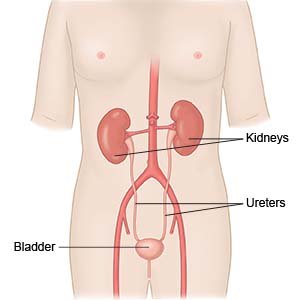Percutaneous Kidney Biopsy
Medically reviewed by Drugs.com. Last updated on Aug 4, 2025.
What do I need to know about a percutaneous kidney biopsy?
A percutaneous kidney biopsy is a procedure to remove a small sample of kidney tissue. It may be done to drain an abscess (pocket of pus). It may also be done to check for kidney disease or cancer.
 |
How do I prepare for the biopsy?
- Your healthcare provider will tell you how to prepare. He or she may tell you not to eat or drink anything after midnight on the day of the procedure. Arrange to have someone drive you home when you are discharged.
- Tell your provider about all medicines you currently take. He or she will tell you if you need to stop any medicine for the procedure, and when to stop. He or she will tell you which medicines to take or not take on the day of your procedure.
- Tell your provider if you have other medical conditions, such as diabetes or high blood pressure.
- You may need blood and urine tests before your procedure. You may need an ultrasound, CT scan, or MRI.
- You may get a shot of numbing medicine where you will have the procedure. Medicine to decrease bleeding may also be given with the local anesthesia. You may still feel pressure or pushing during your procedure, but you should not feel pain. You may also get a type of anesthesia through an IV to keep you comfortable, relaxed, and drowsy during your procedure.
Related medications
What will happen during the procedure?
- A CT scan or an ultrasound may be used to help your healthcare provider see your kidney better. He or she will make an incision in the skin over the kidney area.
- A long needle will be inserted and guided into your kidney. You will be asked to hold your breath as your healthcare provider inserts the needle into your kidney. The needle has a sharp edge that will remove a small piece of your kidney. Your healthcare provider may need to insert the needle a few times to get enough tissue.
What should I expect after the biopsy?
You will be taken to a room to rest. Do not get out of bed until your healthcare provider says it is okay. You will then be taken to a hospital room.
- You may need to lie flat on your back for a period of time after your procedure.
- You may need tests after your procedure to check for bleeding.
- Ask your healthcare provider if he or she needs to measure or collect your urine before you dispose of it. Your healthcare provider may need to look for blood in your urine.
What are the risks of a percutaneous kidney biopsy?
- After your procedure, you may have pain, dizziness, or problems urinating. You may bleed more than expected. You may develop an infection or have blood in your urine. Blood clots may form in your kidney. The procedure may increase your risk for long-term high blood pressure. You may also develop a fistula (abnormal connection between your blood vessels). The wall of your blood vessel may widen. You can have heavy bleeding if the blood vessel bursts.
- Air may enter the space around your lung, causing your lung to collapse. You may need a blood transfusion or surgery to fix problems that occur after your procedure. If the mass in your kidney is cancer, this procedure may cause the cancer to spread. Rarely, this procedure may lead to kidney loss.
Care Agreement
You have the right to help plan your care. Learn about your health condition and how it may be treated. Discuss treatment options with your healthcare providers to decide what care you want to receive. You always have the right to refuse treatment. The above information is an educational aid only. It is not intended as medical advice for individual conditions or treatments. Talk to your doctor, nurse or pharmacist before following any medical regimen to see if it is safe and effective for you.© Copyright Merative 2025 Information is for End User's use only and may not be sold, redistributed or otherwise used for commercial purposes.
Further information
Always consult your healthcare provider to ensure the information displayed on this page applies to your personal circumstances.
